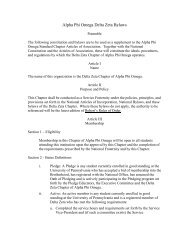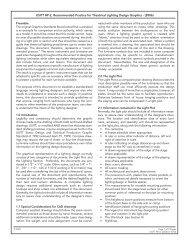<strong>Penn</strong> <strong>Philosophical</strong> <strong>Perspectives</strong>not always push us to vengeance, but they tend in that directionby desiring the harm <strong>of</strong> the perpetrator, in effect asserting moralcommon expression <strong>of</strong> equality-based self-respect, it is not anappropriate one. perpetrator’s repentance rather than his suffering. If the perpetratorrepents, he acknowledges that his prior assertion <strong>of</strong> moralsuperiority was mistaken, and admits that he and the victim aremoral equals (at the very least). This in effect removes the fac-a claim <strong>of</strong> moral inequality can be caused by inanimate objectsor animals without engendering any sort <strong>of</strong> resentment that onefeelings miss the point, unless the purpose in causing harm tothe perpetrator is to secure his repentance, to “make him sorry.”This is only one variety <strong>of</strong> vindictiveness (we are <strong>of</strong>ten vindictivewithout regard to the perpetrator’s repentance), and even sorepentance-oriented vindictiveness ought to be just one weaponin one’s repentance-oriented arsenal, which for example oughtalso to include moral instruction to allow the perpetrator to seethe error <strong>of</strong> his ways. Indeed, moral instruction would seemto be a more effective tool than punishment because punishmentcreates an external incentive to repent (namely, wantingthe punishment to stop) that may weaken the purity and sincer--then, should be at most a second option to moral instruction if itis motivated by equality-based self-respect.January 2010 ness,though, we must make sure that equality-based self-respecthave any obvious, serious negative consequences, so it wouldappear not to be a vice, meaning that vindictiveness based uponthat either equality-based self-respect or vindictiveness basedon it are virtuous, since this brand <strong>of</strong> self-respect may fall intothe neutral category <strong>of</strong> feelings and passions, worthy <strong>of</strong> neithercensure nor praise. I contend that it is at best minimallypraiseworthy, and certainly not the most praiseworthy form <strong>of</strong>self-respect.For a disposition such as equality-based self-respect to bepraiseworthy, it must tend to push one toward laudable outlooksor behaviors. This it does in general terms; a respect for oneselfas the moral equal <strong>of</strong> others goes hand-in-hand with a respectfor others as the moral equals <strong>of</strong> oneself, which is a preconditionfor ethical behavior toward others. However, thinking<strong>of</strong> one’s own moral agency in comparison with that <strong>of</strong> othersmuch <strong>of</strong> an autonomous moral agent as those around me, I willalso assume that what is morally right for others is also morallyright for me (since we are moral equals, with equal responsibilities).I will thus take very seriously the moral reasoning <strong>of</strong>others in deciding how I should act myself. I will not imitateothers whom I believe to be acting immorally, <strong>of</strong> course, butif I see broad patterns <strong>of</strong> behavior among those around me Imay assume that those patterns <strong>of</strong> behavior are typical <strong>of</strong> moralI am concerned that this sort <strong>of</strong> reasoning may lead one to adoptothers’ moral codes without seriously considering whether theymatch one’s own instincts. The idea that we are moral equalstoo quickly becomes the idea that, as moral equals, there is onemoral system that works for all <strong>of</strong> us. Thinking <strong>of</strong> oneself as themoral equal <strong>of</strong> others can thus dull the impetus to make deci-esand errors become easily entrenched, and the full complexity<strong>of</strong> moral dilemmas is <strong>of</strong>ten obscured by the dominance <strong>of</strong> aence<strong>of</strong> one’s own moral instincts insidiously undermines one’sown moral autonomy. tonomy,rather than on how that autonomy compares with themoral decision-making <strong>of</strong> others, is therefore a more virtu-maturation developed by the psychologist Lawrence Kohlberg,as described by Carol Gilligan in In a Different Voice-etalvalues and constructs moral principles that are universalown moral instincts take precedence over the moral reasoningingdecisions in the same way, what matters about this sort <strong>of</strong>decision-making is its independence, rather than its equalitywith others. If one’s autonomy is limited, one ought merely torespond in a way that preserves and maintains one’s autonomy,without concern for the moral autonomy or authority claimedown moral instinct, then it does not particularly matter whetherershurts this sort <strong>of</strong> self-respect because it shows that one’smoral instincts do not always govern the decisions that decideone’s fate, and indeed sometimes are powerless to govern them.Thus, autonomy-based self-respect also induces an emo- should be directed at establishing one’s own moral autonomyrather than equating it to that <strong>of</strong> others. Sarah, a woman interviewedby Gilligan who faces a complicated abortion decision,vidualworth:I am suddenly beginning to realize that the thingsI like to do, the things I am interested in, and thethings that I believe and the kind <strong>of</strong> person I am,are not so bad that I have to constantly be sittingon the shelf and letting it gather dust. I am a lot17 18
more worthwhile than my past actions have ledothers to believe. (quoted in Gilligan 93; emphasisadded)Sarah’s sense <strong>of</strong> the importance <strong>of</strong> her own beliefs andinstincts is independent <strong>of</strong> how others regard her, and indeedis developed in contrast to it. She thinks <strong>of</strong> herself as more <strong>of</strong>an autonomous moral agent, more worthwhile than others think<strong>of</strong> her, and it seems not to concern her that others do not seeher as she sees herself. Sarah’s self-respect thus derives fromthe knowledge that she has taken responsibility for acting accordingto her own moral instincts, and so behavior undertakenwith this knowledge, rather than vengeance per se, will have theeffect <strong>of</strong> reinforcing her self-worth. Thus Sarah ends a dehu-her own moral autonomy, but she does so according to her own -ingwith her lover’s needs ‘as best I can without compromisingmy own.’” (Gilligan 95) Sarah sees this as acting in a “decent,because she considers it the moral thing to do, because beingvindictive breakup from a bad lover is twice over an assertion<strong>of</strong> her moral autonomy.This suggests that we can develop autonomy-based selfrespectsimply by placing an emphasis on morality in our livesand taking responsibility for the morality <strong>of</strong> our actions. If so,then it is hard to imagine autonomy-based self-respect hav- it is quite likely that I will want others to be autonomous aswell. This ensures that I will treat others as my equals in moral respect without the drawbacks, autonomy-based self-respectthe equality-based version more strongly, I think, but this onlymeans we should work to cultivate the autonomy-based version. may arise from this sort <strong>of</strong> self-respect when harming the perpetratoris seen as the morally right thing to do. For example,if Sarah had been committed to a retributivist morality insteadlover in as painful a way as possible. This then would be oneform <strong>of</strong> vindictiveness arising out <strong>of</strong> respect for the moral order,the other option for grounding virtuous vindictiveness identi-or for other reasons) to a vision <strong>of</strong> the moral order that calls forthe punishment <strong>of</strong> its violators, then one will feel urges to punishviolators. a vision <strong>of</strong> the moral order that includes vengeance. I haveshown that vindictiveness based on equality-based self-respect,January 2010<strong>Penn</strong> <strong>Philosophical</strong> <strong>Perspectives</strong>reasoning unless it is aimed at securing repentance, and eventhen equality-based self-respect is not in itself virtuous. Rely-assumes that it is part <strong>of</strong> the moral order, so some further basisvideany reason to consider vindictiveness moral, but there maybe reasons I have not considered underlying the moral instincts<strong>of</strong> those who do consider vindictiveness moral. In the absence<strong>of</strong> these reasons, though, I cannot allow that there is any trulymoral outlook which vindictiveness supports, and therefore, inmy view, vindictiveness (which in the abstract tends to causeharm) ought not be a part <strong>of</strong> our moral decision-making.However, equality-based self-respect and the vindictivenessthat derives from it are effectively facts <strong>of</strong> human nature.the other hand, if we are interested in becoming more moral,we should work to develop an autonomy-based sense <strong>of</strong> selfrespect,which in all likelihood will reduce our vindictive desires(unless our moral instincts are strongly retributivist). It isingit as such may lead to the cheap forgiveness that concernsrespect or sense <strong>of</strong> morality because it is given without regardfor either oneself or one’s morals. Rather, when one has developeda healthy and proper sense <strong>of</strong> self-respect that does notdepend upon the moral lives <strong>of</strong> others, vindictive urges will inall likelihood vanish on their own.Works CitedGilligan, Carol. In a Different VoiceHarvard UP, 1982.Getting Eventice.jpgFor details on submissions,how to get involved, oradvertising, please visit:www.ppperspectives.org18
















